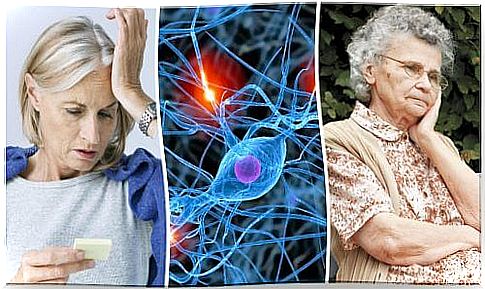8 Signs Of Dementia That Everyone Should Know
Even though some of the first manifestations of dementia may seem normal, if they become frequent, you should know how to take them into account to detect a possible disease the most early as possible.

Dementia is a syndrome, usually progressive in nature, which is characterized by the wear and tear of cognitive functions. Since it is important to detect the signs of dementia early so that you can act as early as possible, here we are going to share the top 8 with you.
The cognitive functions guarantee the competences of memory, the intellect and the capacity to carry out an infinite number of activities of the daily life.
This is a deterioration that goes beyond what is considered to be a consequence of aging. Usually, it is one of the reactions to other diseases that affect the brain in a primary or secondary way.
Today, it is one of the pathologies that cause the most disability and dependence in the elderly.
While several methods have been developed to overcome it, it continues to be unclear. As well for affected patients as for healthcare professionals or relatives.
- According to data from the World Health Organization, worldwide there are 47.5 million people with dementia. Each year, 7.7 million more are recorded.
Most worrying is that many people still do not know about the disease. Although it is relatively common, they do not know how it develops.
Discover them!
1. Difficulty choosing words

One of the earliest signs of dementia is having trouble finding the exact words to express your thoughts.
Patients who begin to develop this condition may spend several minutes trying to remember a particular word, and even if they have just said it, they cannot remember which one it is.
2. The difficulty in understanding time
People who have a high risk of suffering from this disease have serious difficulties understanding what the past, present and future are. Often when we talk to them about time, they fail to understand what it means and confuse the moments.
3. Short-term memory problems
Short-term memory problems can seem common. But in reality, these are early signs of the wear and tear that the brain is suffering from due to dementia.
Being unable to remember important events or events that took place within hours or days. This indicates that something is not working well with the brain functions.
Likewise, when the patient walks into a room or a place, he / she forgets for what purpose he / she came.
4. Mood changes
Because of the changes in brain chemistry when dementia occurs, those affected easily fall into depressive or irritable mood states.
Sudden changes in personality or behavior can indicate that cognitive functions are deteriorating.
5. Difficulty in carrying out daily tasks
Another early warning sign that people with dementia experience is difficulty doing a variety of everyday, ordinary tasks that are usually done every day.
Someone whose cognitive functions begin to be affected is no longer unable to perform professional jobs, drive to a familiar place or do household chores.
6. The inability to recognize places
As dementia progresses, patients begin to have difficulty recognizing places where they are often found. In fact, inside their own home, they may feel lost or confused.
Not remembering why or how you got to a certain place, or knowing where you are, is a sign of dementia.
7. Lethargy

The deterioration of cognitive functions brings with it a series of chemical reactions. They impact both morale and the ability to retain certain physical skills.
In addition, as a result, the person begins to feel more tired than normal. And she no longer has the motivation for the activities she used to love to do.
8. Difficulties in writing
Just as these patients have difficulty finding their words and speaking, they have trouble writing as before.
Changes in writing and expression problems via this mode are a warning sign that we must analyze and relate to this condition.
- In many cases, dementia cannot be prevented or stopped. But it is essential to take these signals into account to find a treatment that can remedy them.
But remember, the sooner the early signs of dementia are detected, the more likely you are to have a good quality of life.









